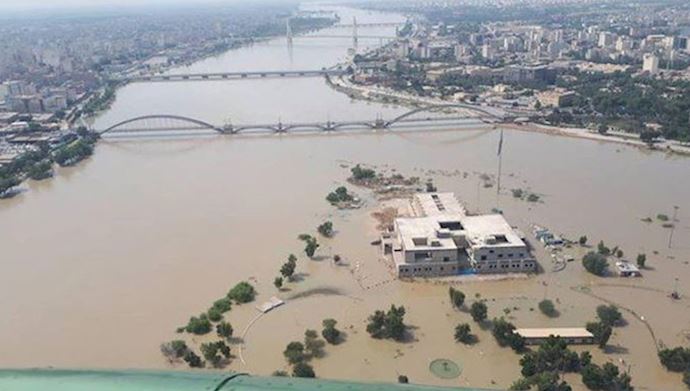
Khuzestan has been under flooding, since last week, while reports indicate that no aid has been provided by the regime and they have been sending security forces to suppress any voice of protest.
According to regime officials, a total of 28 people have been arrested for reporting news about the recent deadly floods that have devastated Iran.
Arrests in Khuzestan Province
24 Internet activists were arrested in Khuzestan Province for their role in publishing news of the floods in the province, according to the head of provincial cyber police, Shahin Hassanvand. Khuzestan was one of the provinces hit hardest by the disaster, and regime officials have withheld vital information about casualties and damage to the region. The news that has been provided has been patently false.
A report aired on the state-run ISNA news agency claimed that the activists were arrested for disturbing “public opinion by spreading news and rumors on the floods.”
Hassanvand described the process through which the police hunted down the publishers. “Due to the publication of rumors and fake news on the internet which has led to insecurity in the community’s psychological climate, experts of the police forces monitored social platforms and identified 24 internet users who published deviating news and rumors about the flood and disturbed public opinion.” He also noted that the publishers have been referred to the regime’s Judiciary for prosecution.
Arrests in Tehran
The head of the Cyber Police in Khuzestan said that 24 internet activists were identified and detained for reporting on the devastating floods in the southwestern province, #iran, according to the judiciary’s news agency Mizan Online.
— IRAN HRM (@IranHrm) April 15, 2019
The previous week, four people were arrested in Tehran for “spreading rumors” about the regime’s incompetence in its response to the flood, according to the Capital city’s Chief of Police.
A Threat to Security
The Iranian regime has done everything in its power to prevent its people from seeing the full extent of the destruction from the floods and witnessing the colossal failure of the regime’s response in its aftermath. This has proved to be impossible. At least 25 out of Iran’s 31 provinces sustained heavy damage due to the floods, and survivors of the disaster shared videos and pictures on social media of the flood. Public confidence in official reports about the flood eroded quickly as anger mounted over the regime’s failure to provide emergency aid.
In late March, as floods raged across the country, regime Attorney General Jafar Montazeri announced that publishing “fake” news (information contrary to official regime reports) about the floods was a violation of national security and that those found in violation would be dealt with for “disrupting the security of the country.”
#IranFloods April 13 #Ahvaz W #Iran
Following the protest of the stricken area to the Iranian regime’s incompetence in dealing with the floods, the regime brought armoured vehicle to the streets fearing of rising protests. pic.twitter.com/AwEpNZIZQ9
— Iran News Wire (@IranNW) April 13, 2019
Human rights groups report that another 11 relief workers were arrested in Khuzestan by the Revolutionary Guards (IRGC). Another 22 rescue workers were arrested in Khuzestan by MOIS agents. The regime has banned all non state-sanctioned aid to flood victims.
Growing Protests
Residents of flood-stricken areas have greeted regime officials and IRGC forces who have attempted to visit with angry protests. The regime has responded to these protests with suppressive actions.
According to reports from MEK sources inside Iran and videos shared on social media, the regime sent security forces to suppress dissent in Khuzestan in response to protests in the Eyn-e Do and Shelang Abad regions in Ahvaz. Other reports indicate that troops from the Fatemiyoun Division, which is comprised of Afghan nationals, were dispatched to Poldokhtar, which was destroyed in the floods.
During the floods, Iranians in some areas were stranded on rooftops for days waiting for a rescue that never came. Entire villages were left without food or drinking water. People in Shiraz were left to pull bodies out of the flooded streets. During the final wave of flooding, the regime called for evacuations, but it didn’t tell people where or how to evacuate.
Finally, the Iranian government is sending troops to the areas that were destroyed by floods. The regime clearly has the resources to send people and equipment quickly when it feels it is necessary. But even now, with the country in ruins, the mullahs aren’t providing aid. The troops haven’t arrived with boats and supplies. They have come with tanks and guns. And the people are angry.
Staff writer
